Suspending Disbelief
With Penn and Teller on tour in Australia , Coral Drouyn looks at the historic tradition of magic in Australia’s theatre world.
You can’t truly love theatre and not believe in magic. It happens every time the lights go down, the curtain goes up and we are transported to another world. That’s magic! We believe the actors are other people, and that the story they are telling is the truth. We accept that bursting into song, or a dozen dancers suddenly appearing on the stage, is all perfectly normal and we are willing participants sitting in the stalls. The lights appear from nowhere, the chandelier almost falls on the audience, the pumpkin turns into a glass coach, thousands of animals stampede and lions can talk. Add to that, gigantic cats that sing and dance at night in a huge city dump, and of course we can’t forget that Harry Potter is now a stage show, literally creating Hogwarts’ magic before our eyes.
All that is needed is for us to suspend disbelief - then we are kids again, wondering how Uncle Harry made a 20-cent piece disappear. You simply can’t have theatre if the audience isn’t prepared to make that leap. But what of those on the other side? Those who create the magic.

Penn and Teller will embark on their first tour of Australia in June and July, and only the worst kind of theatre snob would dare to ask “Penn and…Who?” Renowned the world over, and perhaps the most successful magicians of all time, the two are masters of illusion, sleight of hand, and comedy. Arguably the highest paid act of their kind in the world, they have performed together for over 40 years, been resident in Las Vegas for 20 years, and have had three shows on Broadway. While Teller (Raymond - yes, he does have a first name) decided very early in their career not to speak on stage, to lessen the chances of being heckled, Penn Jillette can and will talk on just about any subject you can name.
Between them they have written more than a dozen books, appeared in over 50 different television shows, as well as their own current series Penn and Teller Fool Us, and more than 20 films. Teller has directed Shakespeare (including Macbeth and a magic-full version of The Tempest), and taught Greek and Latin, while Jillette has raised several million dollars for charity through Celebrity Apprentice and even Dancing with the Stars. On top of all that he is an avid upright bass player and even an inventor. If all of that doesn’t make them superstars, I don’t know what it would take. Yet, even with their credentials, they would be the first to tell you that what they do is not magic. They are not gods; they don’t have superpowers; they deal in illusion, sleight of hand, perception and misdirection (ever been distracted by Penn’s red finger-nail?). They will explain that what they do is the result of technique and practise. It takes endless hard work to make an audience feel a sense of wonder and awe. The secret is … they know how it’s done, and we don’t.
Of course, most of us have forgotten, or perhaps never knew, that not so long ago - in the 20th century (50-100 years ago) magicians were revered, and the “greatest magician in the entire world” was an Australian. Les Cole (1892-1978) was brought up in Wangaratta and his first job was driving a baker’s cart. He started, like most magicians do, as a child performing simple tricks with a plastic wand and a cup. But by the time he was fifteen he was already touring the country with a travelling show, and he had founded the Australian Society of Magicians Incorporated, the fourth oldest magic society in the world. And he became ‘The Great Levante’. If I had known, when my parents worked with him in the 1950s, that I had met the world’s greatest magician, I would have paid far more attention. And if you’ve ever seen a magic show where someone is suspended on a sword and then drops and is impaled, you have seen a trick created by Les Cole nearly 100 years ago.
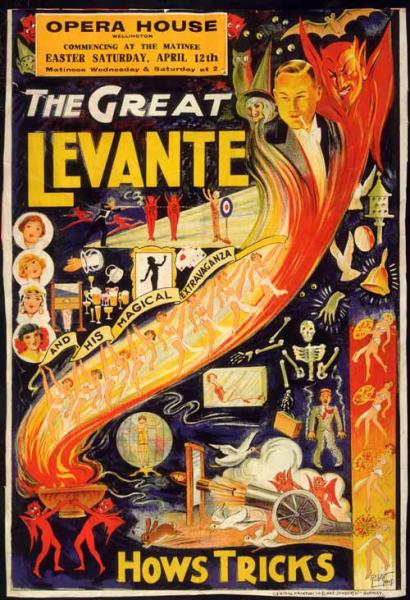
Australia has a long history of producing world class magicians, especially grand illusionists. Maybe it’s to do with the convict mentality and the need to escape that is at the core of our heritage. Or maybe it’s just that we are free thinkers in a world that has been governed by the restrictions of the word “can’t”. And it wasn’t restricted to men either. In an age when women were largely considered to be home-keepers or harlots, there were some who were trail blazers in the world of magic. For many this was restricted to being the magician’s assistant, even if they were an integral part of the act, like the very beautiful Geelong girl Loretta Millar, who became world famous American magician Dante’s assistant and was billed as Moi-Yo Millar. Others aspired to stardom in their own right.
 Image: Moi-Yo Millar
Image: Moi-Yo Millar
Esme Levante - Les’ daughter - started working on stage with her father when she was only 5 years old. By the time she reached her teens, she was already performing major illusions both here and abroad and had been the “psychic” in a mind-reading act with her dad. But she needed to create her own legacy. She was only 16 years old when she performed the daring feat which saw her shackled and thrown into a freezing cold river, seemingly to drown, only to appear on the surface several minutes later, free and with shackles in hand. It caused a sensation, even though Esme was still considered Levante’s assistant, despite her years as an integral part of the act. It took years (and her father’s retirement) for Esme to become a headliner in her own right. Right into the 1950s and 60s she became a fashionable magic star in the finest clubs in Europe.
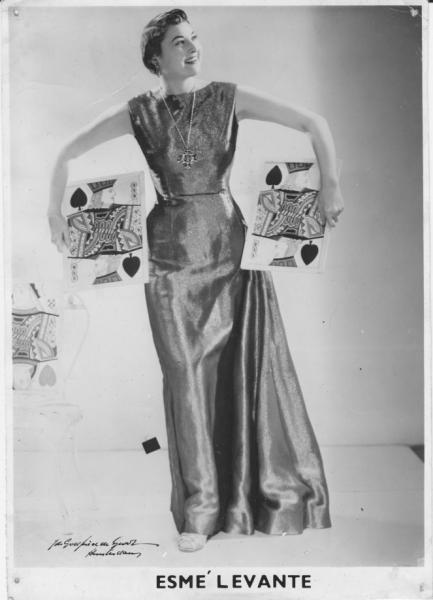
But it’s now a whole new world of entertainment, and what once seemed magical is now almost commonplace. We have a whole generation of people who have grown up with the magic of Harry Potter and Marvel Comic heroes on film.
As Cosentino, one of our greatest showmen and perhaps our finest illusionist of all time, explained, “When the audience watches a film, let’s say a sci-fi blockbuster, the audience knows it’s being tricked into believing the fake worlds, characters and creatures they see on the screen. The sci-fi blockbuster is all fantasy, but the audience happily goes along for the ride. They know the special effects, or let’s call it ‘movie magic’, they see on the screen is not real. But the storytelling and the emotions have to hook us and have some base in reality. When they do, then the audience can buy into the fantasy.”
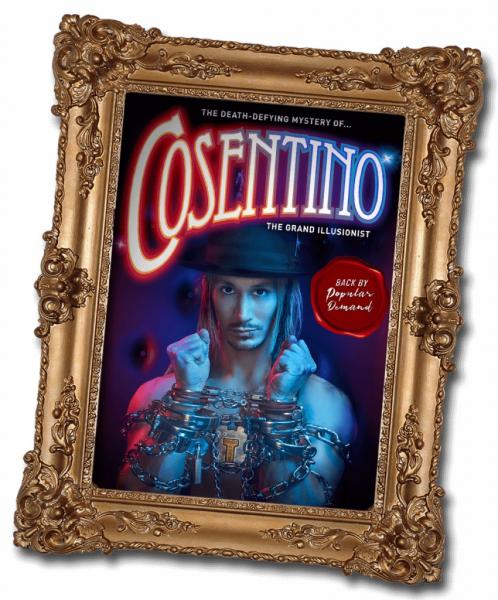
So perhaps it isn’t the magic, but the storytelling and the characters that make shows like Harry Potter and the Cursed Child such a resounding success, as well as being the most awarded new play in history. It re-opens at the Princess Theatre in Melbourne on May 4th for an indefinite run. The production has a permanent magician backstage to work on the illusions. Actors have to be taught the tricks, and props need checking and setting for every show.
We don’t think of special effects as magic, but it’s just another name for the same thing. Paul Cosentino agrees. “Audiences have the answers to many secrets just at their fingertips, and very often an audience may think they know how something is done, but if the magician is still able to baffle them under those restrictions, then the magic becomes even more potent! That’s when the audiences truly gasp. It’s almost to the magician’s advantage at that point. Thus, as magicians we have to stay a step ahead of the audience with technology and understand that it’s not just about secrets. It’s about storytelling, maybe conveying a message and wrapping the illusion up in entertainment, music, dance, lighting etc. It’s a full experience.”
With ticket prices in theatres constantly rising, “the full experience” is what we are all looking for, but all too often we are let down.
Those who have seen Ghost - The Musical came away talking about the special effects, not the songs. Bad news for a musical. On the other hand, Broadway composer Stephen Schwartz is clearly a lover of magic, having written The Magic Show, a charming musical about (and for) Magician Doug Henning, and the blockbuster Wicked, with witches and spells and a perfect magic of its own. Even the opening number of perhaps his finest show, Pippin, promises “Magic to Do”.
Dr Jo Clyne is a magician, but she can’t cure anything. She has a PhD in History and Theatre and became fascinated with magic while studying.
“Magic isn’t really magic, of course,” she tells me, much to my disappointment, “and the majority of magicians these days do close-up magic or strolling magic. It’s the easiest way to make a living. We look like everybody else - no long tailed evening dress and assistants in spangles. That tends to put a barrier between the magician and the audience. And no, I didn’t get given a magic kit when I was a kid (most magicians do). I started learning magic while doing my degree and became fascinated with the skill involved in close-up magic.”
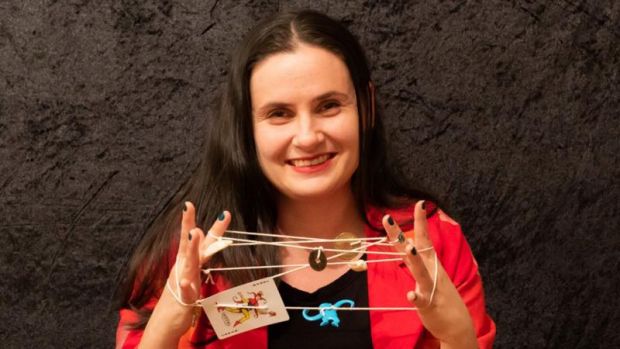
Jo will bring her show to the Melbourne Magic Festival - yes there REALLY is a Magic Festival and it runs from June 27th to July 9th, with 130 performances by 30 different magicians, several of whom have actually fooled Penn and Teller. Conceived by the Australian Institute of Magic, it’s now in its 15th year and is the largest of its kind in the Southern Hemisphere.
Magician Tim Ellis is the frenetic entrepreneur and magician who runs the festival and is delighted to see so many new magicians making their way.
“Magic is thriving,” he tells me. “We no longer have to pretend we have special powers, but it’s still about evoking a sense of awe and wonder. There’s an unspoken agreement that we’re going to deceive you.”
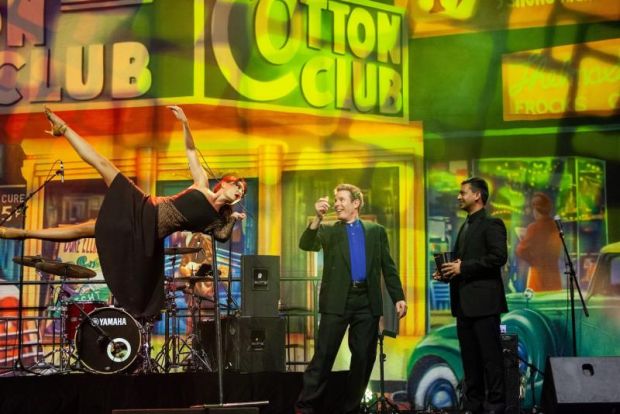 Image: Tim Ellis - Levitation
Image: Tim Ellis - Levitation
Tim actually has his own magic theatre called The Laneway. The location is secret and you don’t get the address until you book your tickets. Winner of multiple international awards, including one for the Guinness Book of Records, Tim kept magic alive during the lockdowns by encouraging other magicians, besides himself, to do shows by Zoom.
“It obviously helped a lot of people to have us come into their homes, even by Zoom, and make them smile, or gasp in surprise. But it’s such a buzz to be back performing live. That’s why the festival is so important. It’s about that connection between magician and audience.”
Tim believes that there are three kinds of audiences for magic.
1) Those who are happy to believe.
2) Those who have to know how it’s done.
3) Those who hate magic - and don’t we all know some cynics that fit that category?
Perhaps, like so many things in the world of theatre, it’s best not to put a label on magic. It’s just something we don’t have an explanation for. I’m a believer. I just don’t want to know how it’s done. That’s show business.
Penn & Teller Australia 2022 Tour Dates
1-11 June – Sydney Opera House
14-18 June – Arts Centre Melbourne
22 June-3 July – Queensland Performing Arts Centre
The Melbourne Magic Festival
See website for all shows - https://melbournemagicfestival.com
Subscribe to our E-Newsletter, buy our latest print edition or find a Performing Arts book at Book Nook.

